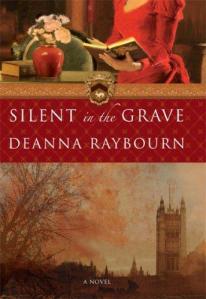I bought this book because I was quite enjoying Tasha Alexander’s historical mystery series and I’d heard from several corners that this series was even better. When I received my copy, I was rather taken aback by its size: 500+ pages presented a brick of a mystery and admittedly, it intimidated me enough that it had worked its way towards the bottom of my TBR.
Then, a couple of nights ago the book I was reading wasn’t working for me, and this book started shouting ‘read me!’ so loudly I could hear it down the hallway (not really) and I’m happy to say not only was it monumentally better and more interesting that the one I had been reading, but that the 500 pages fairly flew by.
I’m a little bit in love with the March family; they all sound mad as hatters. Perhaps that’s a strong way to put it, but they are all decidedly eccentric. Lady Julia’s subtle, dry humour had me smiling throughout and chuckling outright whenever she talked about The Ghoul (I’m not going to explain The Ghoul – I’ll just say it’s not supernatural – because explaining would ruin it, I think).
But parallel to this delicious humour is a much more confronting murder mystery that starts off very slowly (not boring) and gains momentum as the ending nears. Readers who are choosing historical mysteries because they tend to stick with sanitised world views are going to be really disappointed; this book delves into the less conventional and seedier sides of Victorian society.
I’ve already indicated my affection for Lady Julia and her family. The only other real main character is Nicholas Brisbane and I’m not quite sure what to think of him. He makes a good hero of the alpha sort, I suppose, and he’s certainly a ‘still-waters-run-deep’ character, but while I didn’t dislike him, the author never really showed me anything particularly likeable about him either. Tragic, yes, attractive, yes. Warmth and humour….notsomuch. Still, intriguing potential.
The murder mystery was good, although I had guessed the villain long before the denouement. The author did get me to flip suspects for a few brief pages, but ultimately I went back to my first guess. I don’t know if it was because of this, but the actual climatic scene felt oddly anti-climatic. Maybe rushed? I suspect there might have been a nuance or two I missed and a couple of small unanswered questions kept that scene from working for me.
Am I supposed to think that he was always psychopathic and just hid it really well, or that his behaviour at the last was a result of the syphilis? Did he start out good or was he always bad?
INSERT SPOILER TAG HERE
Made no real matter though; the story was thoroughly enjoyable from start to finish and I’m looking forward to acquiring the next books. Another new series!

 A Study in Death
A Study in Death Silent on the Moor
Silent on the Moor Silent in the Sanctuary
Silent in the Sanctuary




 ,
,













 A Crimson Warning
A Crimson Warning Dangerous to Know
Dangerous to Know Silent in the Grave
Silent in the Grave Dead Heat
Dead Heat Vision in Silver
Vision in Silver